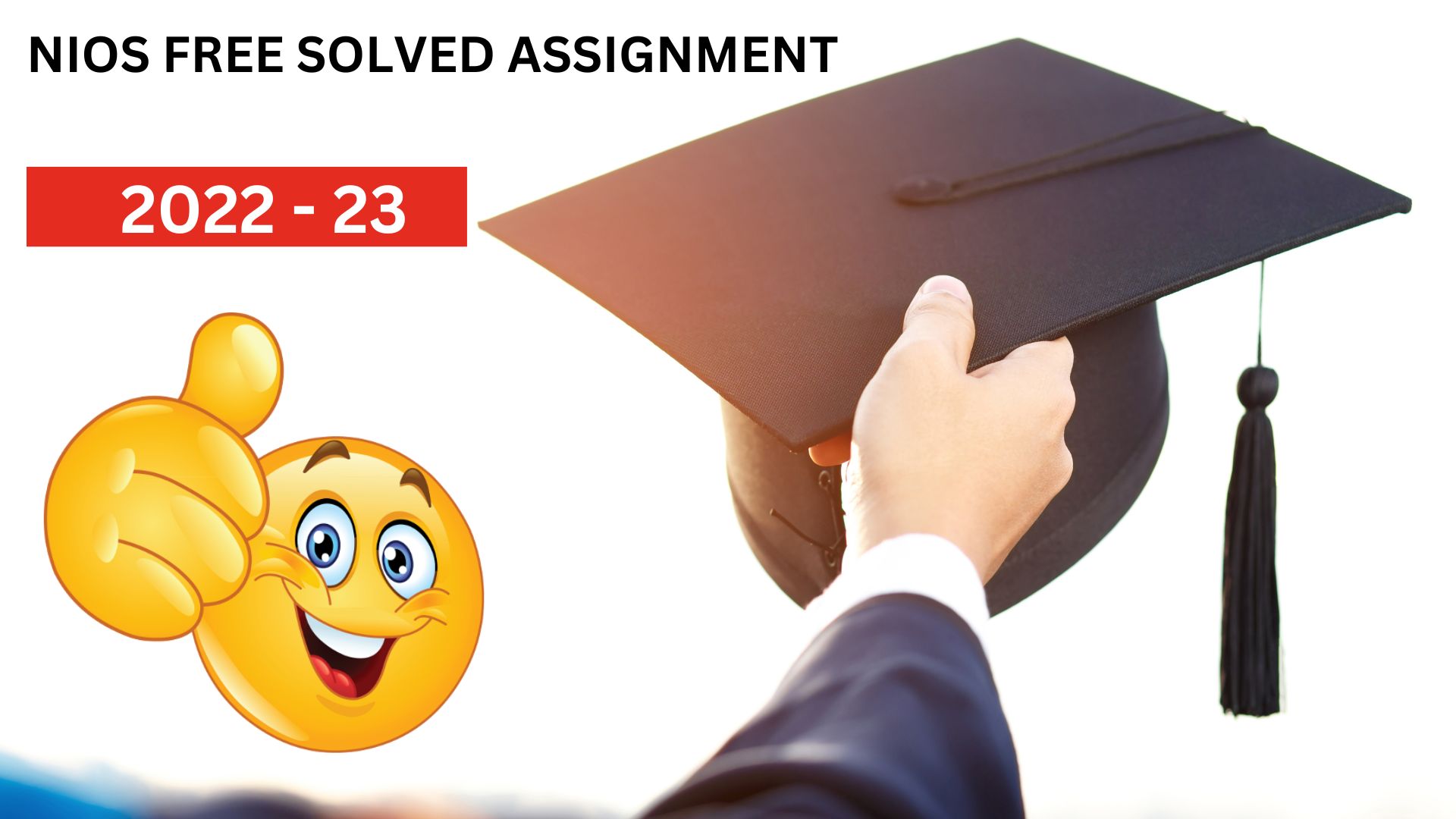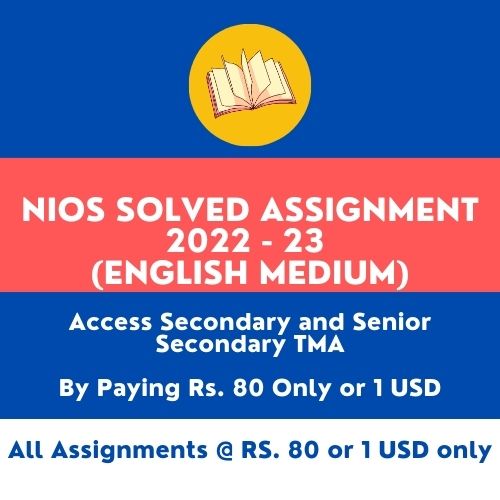NIOS Free Solved Assignment [TMA] 2022 – 2023
Introduction to Law 338 Free Solved Assignment [TMA] 2022 – 23
Tutor Marked Assignment
Max. Marks: 20
In this article, you will get Introduction to Law 338 Free Solved Assignment [TMA] 2022-23. You will solved assignment of other subjects in our page nios solved assignment 202-23.

Note:
(i) All questions are compulsory. The marks allotted for each question are given beside the questions.
(ii) Write your name, enrollment numbers, AI name, and subject on the top of the first page of the answer sheet.
1. Answer any one of the following questions in about 40-60 words. 2
a) Write down name and two points of the ideology? (See Lesson-1)
Ans: An ideology is a set of opinions or beliefs of a group or an individual. There are many different kinds of ideologies, including political, social, epistemological, and ethical.
A political ideology is a set of ideas, beliefs, values, and opinions, exhibiting a recurring pattern, that competes deliberately as well as unintentionally over providing plans of action for public policy making in an attempt to justify, explain, contest, or change the social and political arrangements and processes of a political community.
Social ideology refers to a broader set of beliefs and values that shape social and political systems.
b) Illustrate any two agreements, and Conventions concluded under the auspices of SAARC. (See Lesson-2)
Ans: Answer any one question
2. Answer any one of the following questions in about 40-60 words. 2
a) Cite any four ‘Norm’ creating institutions. (See Lesson-5)
Ans: Answer any one question
b) Elucidate factors necessary for considerations of opportunity to rebut evidence. (See Lesson-6)
Ans: In order to contradict the statements of a witness, the following essential conditions must be fulfilled, such as:
1. The witness is called by the prosecution.
2. Such witness has previously given statement to the police officers.
3. Such statement should be in writing.
4. Such statement has been proved.
3. Answer any one of the following questions in about 40-60 words. 2
a) Mention any four examples of Central Laws in India. (See Lesson-9)
Ans: Examples of Central Laws in India
1. The Indian Penal Code, 1860
The Indian Penal Code, 1860 is the Substantive Law consisting of 511 Sections which deal with specific offences and the corresponding punishments for those offences. It covers a vast range of offences, of which some are cognizable and others are non-cognizable.
2. The Indian Evidence Act, 1872
The Indian Evidence Act, 1872 prescribes the various evidences to be taken into consideration while dealing with a case, whether civil or criminal.
3. The Criminal Procedure Code, 1973
The Criminal Procedure Code, 1973 deals with the procedures to be followed to inflict punishment upon the wrongdoer which includes procedures relating to investigation, enquiry, trial and finally the judgment.
4. Indian Contract Act 1972
Thousands of Contracts are made daily and therefore, the Indian Contract Act, 1872 is an Act of tremendous importance. All the rules regarding valid agreements are mentioned in the Act. The main object of the Act is to see that agreements made in everyday life in accordance with the Act are performed in the interest of the concerned parties and that in case of breach of contract the aggrieved party may have proper remedy in accordance with the Act through the Court of Law.
b) Differentiate between the Substantive Law, and Procedural Law. Write down two examples. (See Lesson-10)
Ans: Answer any one question
4. Answer any one of the following questions in about 100-150 words. Word limit is not applicable for numerical questions. 4
(a) Article 141 declares that the law laid down by the Supreme Court shall be binding on all courts within the territory of India. In a Column ‘A’ power is mentioned. Write down in column ‘B’ which type of jurisdiction is used by the Supreme Court. (See Lesson-13)
|
S. No. |
Column A |
Column B |
|
1. |
Giving advice to the president– regarding any question of law or fact of public importance. |
|
|
2. |
Supreme Court granting special leave to the appeal. |
|
|
3. |
Power to issue writs. |
|
|
4. |
To decide dispute between the Union, and a State, or between one states and another. |
|
Ans: Answer any one question
(b) Explain the following:
1. Tribunal.
2. Public wrong. (See Lesson-14)
Ans: 1. Tribunal: There are many ways to settle a dispute and it is not necessary to be standing in front of a formal Court for seeking justice. Tribunals can be defined as adjudicatory bodies other than courts with administrative or judicial functions. There are various Tribunals constituted under different law for resolving disputes among parties such as ‘Industrial Tribunal’ to resolve industrial disputes,
‘Administrative Tribunal’ for resolving disputes concerning Government, ‘Income Tax Tribunal’ for resolving income tax related disputes etc. These Tribunals are less expensive and less formal than courts and resolution of disputes takes place in a much more relaxed manner. Tribunals are basically constituted to deal with a particular specialized branch of law.
2. Public Wrong: A criminal matter is a legal matter that arises under Criminal Law. Criminal offence i.e. hurt, injury, murder etc. even though committed by one party upon the other party, is considered to be a ‘public wrong’. Public wrong is violation of public rights and duties that affect the entire community. Being a wrong against the whole community, Government of the State files a case against the guilty person. In certain cases, criminal proceedings are initiated on a complaint from individual (other than State).
5. Answer any one of the following questions in about 100 to 150 words. Word limit is not applicable for numerical questions. 4
(a) The preamble to a Constitution is expected to embody the fundamentals values, and the philosophy in which the constitution is based Column ‘A’ mention the objectives. In Column ‘B’ write down the principle. (See Lesson-17)
|
S. No. |
Column A |
Column B |
|
1. |
Spirit of Brotherhood. |
|
|
2. |
A government of the people, by the people, and for the people. |
|
|
3. |
Absence of any arbitrary restraint on the freedom of individual actions, but also the creation of conditions which provide the essential ingredients necessary for the fullest development of the personality of the individual. |
|
|
4. |
State protects all regions equally and does not uphold any religion as the state religion. |
|
Ans: Answer any one question
(b) Explain the following:
1. Electoral Quota.
2. Qualifications required for the Office of the President. (See Lesson-21)
Ans: 1. Electoral Quota
Under the system of election, names of all the candidates are listed on the ballot paper and every voter has to mark his/her preference before the name of the candidate. Voters from the State Legislature Assemblies can cast their vote in their concerned State capital and the Members of Parliament can cast their votes in New Delhi or in their State Capital.
Votes are counted in New Delhi and the election is managed by the Election Commission of India. First of all, the first preference votes of all the candidates are counted. The winning candidate must score more than 50% of the total valid votes polled. This amount of votes is called “Electoral Quota”.
Electoral Quota = (Total number of valid votes polled/1+1= (2)) + 1
2. Qualifications required for the office of the president:
The qualifications required for the office of President are:
1. he/she is a citizen of India;
2. has completed the age of 35 years;
3. is qualified to be elected as a member of Lok Sabha and
4. should not hold any office of profit under the Union Government or any State Government. However, the office of the President, the Vice President, the Governor or the Ministers of Union or State is not considered as an office of profit.
6. Prepare any one project out of the following project given below: 6
a) You are a lawyer. Your friend Nilesh from Nanital city visits your chamber. He asks you what action can be taken as he is pained by seeing that famous Naini Lake is being polluted by 14 drains. It is losing its charm due to pollution, and solid waste which is choking the reservoir’s bed. Encroachment, construction debris, siltation, dumping of soiled waste, and other pollutants are slowly snuffing life out of its natural beauty. Write down the various environmental principle laws applicable, and role of pollution board.
Ans: Simple Steps To Get All the Assignments
1. Simply Pay Rs. 80 Inclusive of taxes through the following Link
2. Download DTS Mobile Application
3. Go to NIOS Solved Assignment (TMA) to Access all the assignments
4. Amazing All the TMA of Secondary and Senior Secondary for Just Rs. 80 Only
Or
b) Sachin is a trained homeopathic Doctor. He has been doing private practices for last four years. Sandha’s husband Rajesh gets high fever at midnight. Sandhya visits Dr. Sachin who prescribes allopathic drugs for viral fever, and later administers allopathic drugs for typhoid fever. Rajesh passed away within eight days of the treatments.
Sandhya visits you. As an advocate how can you help Sandhya?
Give suggestion keeping in view the following questions.
1. Whether Rajesh is consumer?
2. Can Sandhya claim damages?
3. Is there negligence in service?
4. Whether the conduct of Dr. Sachin is negligent, and is there a breach of duty of care?
5. Whether services given by Dr. Sachin come under the purview of definition ‘service’ by Consumer Protection Act, 1986?
6. Cite relevant case laws?
Ans: Answer any one question
So, Finally you reached the end of the post. Hope you like Introduction to Law 338 Free Solved Assignment [TMA] 2022-23. You will solved assignment of other subjects in our page nios solved assignment 202-23. Visit Official website of NIOS for details about assignment.
***
